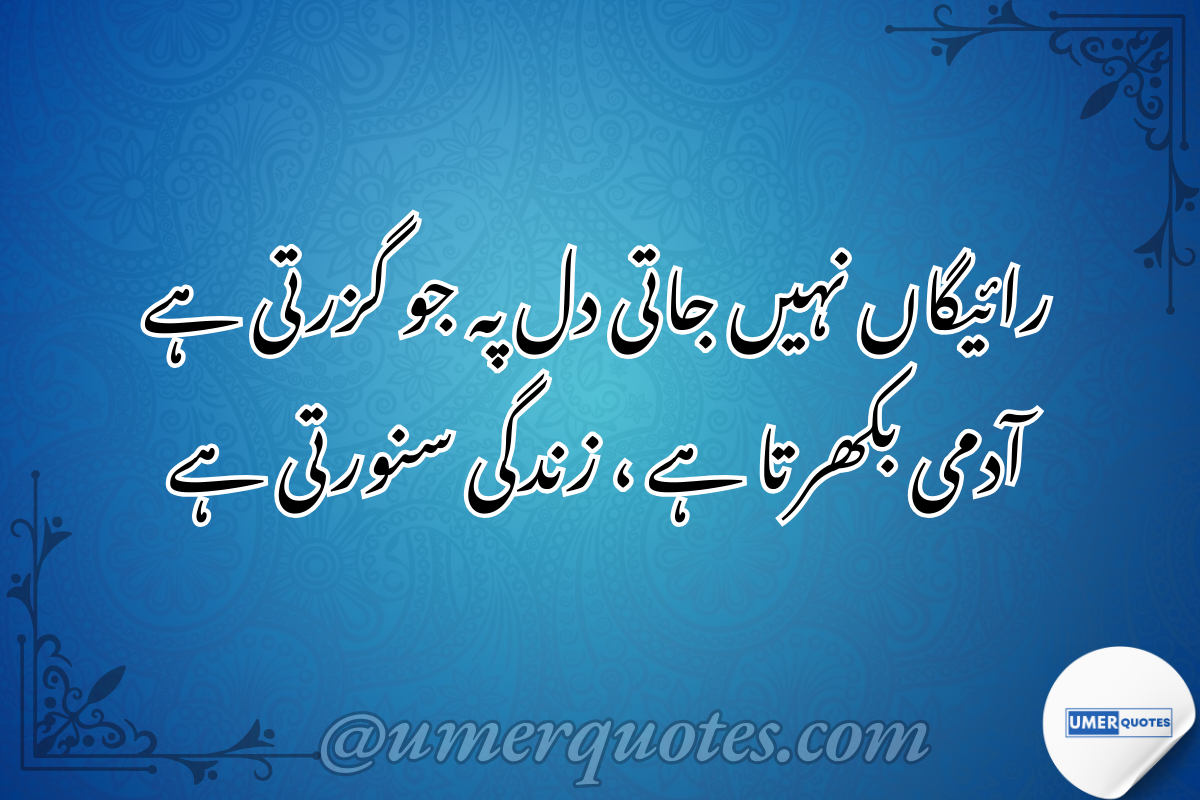
کبھی کبھی چپ رہنا
شکایت کرنے سے زیادہ بہتر ہوتا ہے
Sometimes silence is more effective and better than complaining. When we complain, problems and suffering may increase, but in silence one can preserve one’s dignity and peace. Sometimes by being silent, we reveal our inner strength and wisdom, and others find comfort as well.
Be quiet sometimes:
- This verse tells us that sometimes, it is best for a person to keep their grievances to heart and remain silent.
- When we complain about every little thing, not only do we waste energy, but we cause trouble to ourselves and others. Being silent takes time, especially when words make things worse than better.
The effect of silence:
- Being quiet is not only a source of comfort, it is also a powerful response. It gives others a chance to understand our feelings, and sometimes it makes more sense not to react.
- There is a kind of compromise and wisdom hidden in silence, which can be a sign of inner peace and sincerity.
Message:
This poem teaches us that it is not always necessary to express what we have to say, sometimes it is more effective to remain silent and control our emotions. Complaining may provide temporary relief, but in silence lies a lasting peace and wisdom that leaves a more lasting impact.
رائیگاں نہیں جاتی دل پہ جو گزرتی ہے
آدمی بکھرتا ہے ، زندگی سنورتی ہے
What passes through the heart does not go in vain:
This stanza expresses a deep feeling. It means that whatever passes through the heart, it is never lost, be it happiness or sorrow. Every experience, every feeling leaves a deep impression in the human heart, which becomes a part of the spiritual and mental evolution of the human being. Bitter or sweet memories in life always become a part of our personality, and we learn from them.
Man scatters, life is snarky:
This stanza describes the inner struggle of man and the truth of life. When a person goes through hardships and experiences, he can become scattered, that is, his heart or mind can become restless. But this fragmentation does not always result in destruction. This fragmentation creates new understanding and better life experiences in man. It is this broken man who finds the power to decorate life, because it is the manifestation of his inner strength and courage.
Message:
Whatever happens in life can scatter a person, but this scattering improves his personality and balance of life. No experience is lost but it guides a person to new paths.
آسمانوں پہ اڑو ذہن میں رکھو کہ جو چیز
خاک سے اٹھتی ہے وہ خاک پہ آ جاتی ہے
Keep in mind that fly in the sky:
This verse conveys a loud and profound message, encouraging man to follow his dreams and aspirations. “Fly the skies” means to fly high, strive to turn your dreams into reality and use your full potential. However, at the same time, the poet speaks of keeping in mind, that is, one must be aware of a fact.
click here for more
It rises from the dust and comes to the dust:
This verse is giving a very realistic message that the real reality of man and his foundation is always soil. Whether he reaches the heights or reaches the heights of the heavens, he is ultimately destined to return to where he came from. The meaning of this is that man should not forget his original reality and nature, because the earthly existence of man is always connected to the heights of the world.
Message:
These poems encourage one to be realistic. No matter how high a person rises, one should always remember one’s reality and not forget one’s roots. It is important to understand the impermanence and reality of the world and live accordingly.
دل کے آنگن میں ابھرتا ہے ترا عکس عمر
چاندنی رات میں ہو رات کی رانی جیسے
A reflection of life emerges in the courtyard of the heart:
This stanza is a beautiful and powerful expression, which describes the presence of a loved one in the heart. “Dil ke angan mein bhata hai tera haqq umar” means that the concept and memory of the beloved or dear one is deeply embedded in the heart, as if he is living in the heart as a reality of every moment. “Aks Omar” means that the reflection or influence of the beloved is felt in every moment of life, as if every passing moment of time is immersed in his memory.
Be like the queen of the night in the moonlit night:
This stanza connects the presence of the beloved with a natural beauty. “Chandini raat mein ho raat ki rani jee” means that the presence of the beloved is so charming and bright that he looks like a night ki rani (a beautiful fragrant flower shining in the moonlight) in a moonlit night. The fragrance and radiance of the queen of the night creates a special place in one’s heart, and this image is compared to the presence of the Beloved.
Message:
These poems describe the memory of the beloved and the intensity of his presence, which leaves a deep impression on the heart. The memory of the Beloved and its reflection sit so deep in one’s life that its presence is felt every moment, and it shines in the heart like natural beauty.
باد شام آئے مہک اٹھے مرا صحن عمر
بے مہک جھاڑیوں سے رات کی رانی نکلے
The wind came in the evening and the smell rose up in the courtyard of Omar:
This stanza describes the effects of someone’s memory or presence in the depths of the heart. “Baad Sham Aye” means that the evening, which is a moment of silence and peace, has a special fragrance or memory that fills the heart with fragrance. “Mahek yte mara sahn umr” means as a fragrance spreads in the courtyard, so the fragrance or memories of a lifetime are awakened in the heart. Here “Sahan Umar” is used to show the beauty of a man’s life and his heart.
From the scentless bushes came the queen of the night:
This stanza describes the beauty of the time when the queen of the night (which is a fragrant flower) emerges from the scentless bushes and spreads her fragrance in the moonlit night. It means that sometimes the fragrance or the presence of love in life comes after just a moment of waiting, like a queen of the night shining in the darkness of the night and spreading her fragrance. It is a metaphor that describes the miracles of life or the discovery of love.
Message:
These poems describe the permeation or permeation of one’s memory, which leaves a certain scent or impression in one’s heart at a particular moment in life. Just as the queen of the night creates light in the blackness of the night with her fragrance, so sometimes in life the memory or love of a person fills the heart with a new color.
مجھے دنیا کے طعنوں پر کبھی غصہ نہیں آتا
ندی کی تہ میں جا کے سارے پتھر بیٹھ جاتے ہیں
I never get angry at the taunts of the world:
This stanza shows a strong and peaceful mentality. The poet says that he never gets angry at the taunts or criticisms of the world, that is, he considers these criticisms or accusations ineffective. It is a symbol of peace of mind and self-confidence, where one does not allow the negativity of the world to affect one’s mental or emotional state. These verses indicate that a person should have such strength and peace within himself that he should not be affected by negative voices from outside.
All the stones go to the bottom of the river and settle down:
This verse expresses a profound truth. The concept of a stone going to the bottom of a river shows that what appears on the surface, actually goes down and finds peace. The stone sitting quietly under the stream indicates that with the passage of time, a person also calmly accepts difficulties, taunts or criticisms as a part of his life.
Message:
These poems emphasize the power of calmness and patience instead of reacting to the world’s unnecessary criticisms or difficulties. Just as the stones settle down in the river, so a person should neutralize his troubles and taunts and live peacefully. These poems highlight the importance of patience, calmness and mental maturity.
Click Here for more Urdu Quotes

پھر وضع احتیاط سے رکنے لگا ہے دم
برسوں ہوئے ہیں چاک گریباں کیے ہوئے
Then the situation started to stop carefully:
This stanza describes a psychological and emotional state. “Then the situation has stopped cautiously” means that the person has now become cautious, the process of being cautious and the instinctive response has increased within him. Perhaps after a traumatic experience or accident, the person is trying to live more thoughtfully and carefully.
It’s been years since the chalk necklaces:
This stanza shows the lingering effects of a deep sorrow or sorrows. “Choke neck” means to tear the neck, a metaphor that expresses intense emotional pain or grief. In this stanza, the poet is telling that he has been broken internally for years and has suffered great sorrow or grief in the past. The image of tearing one’s neck is a sign of being internally uncontrollable or in deep emotional distress.
Message:
These poems show the intense emotional state within a person that continues for a long time. When a person constantly experiences pain or grief, he becomes cautious and sensitive in his life, as his reaction or approach to life becomes cautious. In these poems, the bitter realities of the past and their effects are described, which cause deep silence and caution in man.







